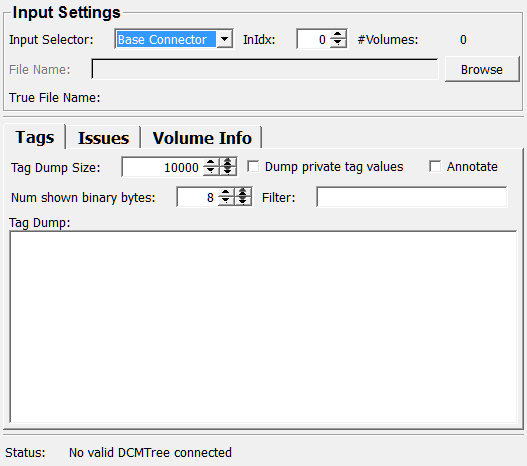BaseToMultiFileVolumeList¶
- MLModule¶
author
package
dll
definition
see also
keywords
Purpose¶
The BaseToMultiFileVolumeList creates a MultiFileVolumeList from a given input Base object if such a conversion is possible.
The typical case is a connected DCMTree Base object which directly can be converted to a MultiFileVolume. Since most modules supporting MultiFileVolumes expect a MultiFileVolumeList this module create such a list with one entry.
If no conversion is possible then the output MultiFileVolumeList still remains valid, however, it will not contain any entry.
Windows¶
Default Panel¶

Input Fields¶
inputBase¶
- name: inputBase, type: MLBase¶
Allows the connection of Base objects from which a DCMTree object can be retrieved, such as MultiFileVolumeList
Output Fields¶
outputMultiFileVolumeList¶
- name: outputMultiFileVolumeList, type: MLBase¶
Provides the output MultiFileVolumeList. It will always exist, however, it may be empty if a conversion from the input object is not possible. On success it will contain one MultiFileVolume.
Parameter Fields¶
Field Index¶
|
|
|
|
|
|
|
|
|
|
|
|
|
|
|
Visible Fields¶
File Name¶
- name: unresolvedFileName, type: String, deprecated name: unresolvedDcmInputFileName¶
If a loading operation from disk is selected as input in the
Input Selectorfield then the file name from which the DICOM tree shall be loaded is specified here. Otherwise this field is insensitive.
True File Name¶
- name: absoluteFileName, type: String, persistent: no, deprecated name: dcmInputFileName¶
If File is selected as input in the
Input Selectorfield then the file name from which the DICOM tree shall be loaded is specified here. Otherwise this field is insensitive.
Input Selector¶
- name: inputSelector, type: Enum, default: BaseConnector¶
Selects the input DICOM tree shall be retrieved from the input connector or whether it shall be loaded from a file.
Values:
Title |
Name |
Description |
|---|---|---|
Base Connector |
BaseConnector |
If possible then the DCMTree object is retrieved from the Base input connector. |
File |
File |
If possible then the DCMTree object is loaded from a file whose path is determined with |
InIdx¶
- name: inputVolumeIndex, type: Integer, default: 0¶
If a base input is selected as source and a MultiFileVolumeList is connected then one of multiple volumes can be selected with this field. The number of available volumes is shown in the #Volumes field. Otherwise this should always be 0.
#Volumes¶
- name: numVolumes, type: Integer, default: 0¶
This read-only field shows the number of available volumes. For most inputs this will be 0 if no DICOM tree is available, 1 if there is any, or any other number for a lists of volumes at inputBase if a MultiFileVolumeList base object is connected and selected in Input Selector.
Tag Dump Size¶
Dump Private Tag Values¶
- name: dumpPrivateTagValues, type: Bool, default: FALSE¶
If enabled then values of private tags are decoded if decoders are available.
Num shown binary bytes¶
- name: numShownBinaryEntries, type: Integer, default: 8¶
Number of shown entries of binary tags.
Annotate¶
- name: annotate, type: Bool, default: FALSE¶
If enabled then tags are annotated with further descriptive information such as possible types (1=Mandatory, 1C=Conditionally Mandatory, 2=Mandatory, may have zero or one item, 2C=Conditionally Mandatory, but may be empty, 3=Optional) and possible meanings of the tag. Note that no context analysis is performed for that information and therefore all possible and perhaps redundant meanings are shown.
Filter¶
- name: regExLineFilter, type: String¶
If not empty then the regular expression is used to filter all lines of the tag dump. Examples:
.* // Matches all paths.
.*logo.* // Matches anything containing ‘logo’ (case sensitive)
.*[lL][oO][gG][oO].* // Matches anything containing ‘logo’ (case insensitive)
.*.[jJ][pP][gG] // Matches anything ending with .jpg where jpg is case insenstive.
.*.JPG|.*.jpg // Matches all paths ending with either ‘.jpg’ or with ‘.JPG’.
.*d.* // Matches all paths containing at least one digit.
.*[[:digit:]].* // Same as above.
.*[[:xdigit:]].* // Matches all paths containing at least one hexadecimal digit.
.*l.* // Matches all paths containing at least one lower case character.
.*[[:lower:]].* // Same as above.
.*u.* // Matches all paths containing at least one upper case character.
.*[[:upper:]].* // Same as above.
.*s.* // Matches all paths containing at least one white space character.
.*[[:space:]].* // Same as above.
.*[[:blank:]].* // Matches all paths containing at least one non-line-separating whitespace.
.*[[:word:]].* // Matches all paths containing at least one word character (alphanumeric characters plus the underscore).
.*[[:w:]].* // Same as above.
.*[[:graph:]].* // Matches all paths containing at least one graphical character.
.*[5-7].* // Matches all paths containing at least one of the digits 5, 6 or 7.
Tag Dump¶
- name: tagDump, type: String, persistent: no¶
Shows the DICOM tag list of currently selected volume (the dump will be clamped if the tag list is too large).
Issues¶
- name: issues, type: String¶
This read-only field contains a short description about known issues about the currently selected volume - if there are any.
Volume Info Dump¶
- name: volumeInfoDump, type: String¶
Shows a collection of available information about the currently selected volume.
Status¶
- name: status, type: String, default: No valid DCMTree connected¶
Displays information about the availability of an input Base object.